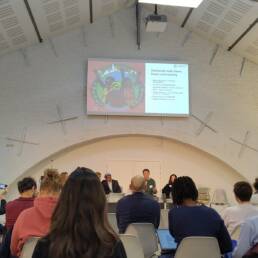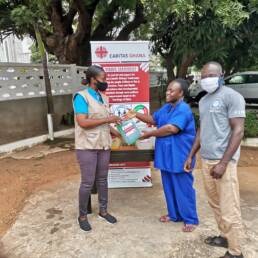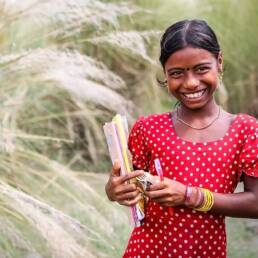Author
Luisa Fondello
Policy and Advocacy Officer
Tel: +32 (0)2 235 03 93
lfondello@caritas.eu
Food security worldwide is still possible. Caritas Brazil supports agroecology and family farming in rural areas while fostering sustainability, innovation and community engagement.
Inflation is spiking, fuel and food prices are rising, and this is only likely to worsen as the war in Ukraine continues, impacting global food supplies of wheat, sunflower oil and other basic cereal crops and oils so many countries in the world – and people – depend on. Beyond peace and humanitarian efforts to end the war in Ukraine, the question now is what can we, ordinary citizens, and what can our political leaders do to lessen the impact on food security and nutrition worldwide? And what can we do to turn this into an opportunity to make our food systems sustainable?

Agriculture and social economy in Brazil
Part of the answer – and hope – is in small-scale, local social economy initiatives. Spread all over the world, they offer alternative ways to create decent jobs, to seek and use profit, to trade, and to produce things, including food. In a settlement in the rural area of Sobradinho (Federal District, Brazil), the crafts association “Renascer” (that means born again), created officially in 2020 and led by Edna, brings together 15 local women working on handicrafts and farming. Each has her own individual livelihood project, but they get together once a week to share their knowledge and skills and learn from each other about crochet, embroidery and sewing, making bags, kitchen clothes and scarfs, and about growing rice, beans, corn, coffee, manioc, pepper, pumpkin, and sweet potatoes. At the same time, they seek structural changes and increased support for their type of work – agroecology, family farming, to solidarity economy. They are engaging parliamentarians to get an authorisation to build artisan wells, essential for the continuation of their subsistence farming and for up-scaling production for commercialisation. They are seeking donations of natural fertilisers from the Ministry of Agriculture. They are looking for funding opportunities to build a water diversion structure. And Caritas Brazil is offering support in this process.
Not so far from “Renascer”, is the “Horta Girassol” Institute, a community garden managed by Hosana and her family, located in an area of low income and low Human Development Index, near the federal district’s biggest penitentiary. “Horta Girassol” emerged in 2006 as a form of protest: a group of residents cleaned up the area and created a vegetable garden after a hantavirus outbreak killed 10 people and the government did not respond to the local population’s demands to remove the open-air dump.
Today, “Horta Girassol” covers 5,000 square meters and has been recognised by the United Nations as an example of urban agricultural production fostering sustainability, innovation, community engagement and food security. Through agroecological and agroforestry practices, it produces a wide variety of vegetables, fruits and herbs, and sells organic produce at affordable prices to the local community. The Institute also participates in social inclusion projects in partnership with public schools and contributes to promoting sustainable food production, for example, by training students with disabilities on sustainable food, by delivering training courses on agroforestry, and by teaching local women about food security and nutrition. And “Horta Girassol” is still only beginning – Hosana and her family’s goal is to build a restaurant and to turn their project into a school – a school about farming and food, about respect for nature, fair trade, solidarity, cooperation, and democracy. Caritas Brazil is also supporting “Horta Girassol”.

I learned about these projects when visiting them during a recent trip to Caritas Brazil’s national office in Brasília. A couple of days before travelling from São Paulo to Brasília, I was having dinner with a group of friends and tried to explain to them what social economy, or “economia solidária” as we call it in Brazil, is. I told them about enterprises that have a social and environmental mission and that seek profit, but not at all costs. These businesses reinvest their profit in social goals, through democratic decision-making processes. I mentioned how they offer job opportunities to people who are in vulnerable situations and face discrimination, and who would hardly get a decent job otherwise. I also told them about our work at Caritas Europa, advocating for the European Union to enhance its support to such businesses, and to make them a priority partner in its cooperation with the private sector.
Their reactions varied, some understood the essence of what I was saying, others questioned whether we were living in an alternate reality; a utopia. My response to them was similar to what Caritas Brazil’s colleagues have been saying to the Brazilian government repeatedly and similar to what we at Caritas Europa have been telling EU decision-makers for the past few years. A solidarity economy has existed in Brazil for decades. Caritas Brazil has been working to strengthen it for the past 40 years. Cooperatives, which are just one of the many forms of social economy, employ almost 10% of the world’s employed population, over one hundred million people, which is 20% more than the number of people employed by multinational enterprises. The truth is that there are ways to build a human-centred economy, we just need to believe in them.
We need more initiatives like Edna’s and Hosana’s. We need more organisations like Caritas Brazil, committed to supporting humble projects with great potential. We need big actors like the EU to take a strong stand, making clear that social economy is the way to go. We need public authorities and international development donors to allocate resources to sustainable and inclusive food production practices. This includes shifting from the agribusiness model toward family farming, agroforestry and agroecology, and prioritising investments in partnerships with actors like Edna and Hosana.
In the meanwhile, we need to spread the word about these initiatives that are taking place in our reality. Many people lack awareness of harmful and unsustainable practices of our current food systems. But raising awareness about them is just half the solution. We also need reasons to believe in something different, something better.
Edna is a reason to believe. “Horta Girassol” is a reason to believe. Caritas Brazil’s persistent commitment to solidarity economy is another reason to believe. We will be hoping that the EU’s response to rising food insecurity in the world and the EU’s commitment to its own Social Economy Action Plan will also become reasons to believe.












